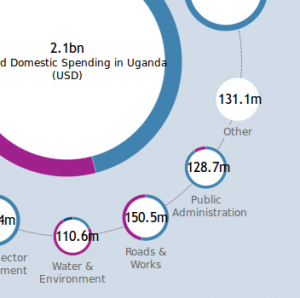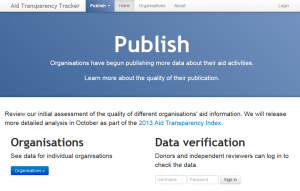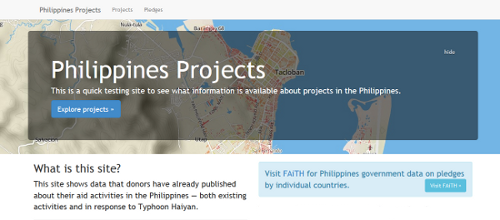Top 5 priorities for the IATI technical meeting
Next week, the IATI Technical Advisory Group (TAG) will meet in Montreal. The name is somewhat misleading though, as the TAG includes everyone active in the IATI community – both policy AND technical staff.
The last TAG was almost two years ago, and the next one might not be for a while, so we’re keen to ensure it’s a productive week!
Here are our top five priorities for the meeting:
1. Linking aid and budgets

One of our top priorities is to have a discussion on the budget identifier pilot work that we’ve been working on with DFID, Sida, Canada’s DFATD and the International Budget Partnership. This work is the last remaining piece of the IATI puzzle.
The budget identifier will make it easier for partner countries to see what aid donors are doing in the context of their own resources. We want to share some of the early findings from the pilot, and to discuss where we go next.
2. Data quality

It might be dry, but data quality is absolutely essential to ensuring IATI can deliver on its promises. We commit to keep going on about improving data quality until it’s sorted.
The TAG will provide us with the opportunity to discuss a consultation we plan to launch on tests in the 2014 Index. In particular, we want to discuss how we should measure documents, sub-national location, results, and conditions indicators.
3. Results
One of our key findings from the 2013 Aid Transparency Index is that only a handful of donors are publishing useful, accessible results data – so we are very keen to find out more about how different donors measure and publish results information, how various groups might use this data, how the information could be published to make it more useful and relevant, and how this can all contribute to learning.
We hope to learn more about the work various organisations are doing which can be standardised across publishers, and how the results element of the IATI Standard can be improved to capture the relevant information better.
4. Use of the data
For the last five years, we’ve focused on getting a standard agreed, and then encouraging donors to commit to publish and then begin implementing their commitments. We have a long way to go on that front – and as we mentioned, we’re going to keep focusing on data quality.
However, we do need to begin looking at how the data is being used – it’s important if we want the improvements in aid effectiveness that have been at the heart of IATI from the start. But it’s also important for improving the quality of the data, as publishers begin to see the interesting things that they can do if they release data.
So, we’re looking forward to lots of discussions about different ways we can use the data.
5. Humanitarian flows

There’s been quite a lot of discussion around improving humanitarian flows in the wake of Typhoon Haiyan/Yolanda in November 2013. Both in the immediate response phase and in the long recovery phase, the example of Haiti shows the problems that can occur when there is a lack of information about what different organisations are doing.
IATI has been discussing how it may need to adapt to improve the information it can capture about humanitarian flows. UNOCHA’s FTS was the first humanitarian organisation to publish two years ago, and the EC’s ECHO followed last year. We want to increase the momentum around developing a humanitarian extension to IATI, and we’re keen to work with UNOCHA and others on this.
Meeting up

Three of us will be there from Publish What You Fund – Rachel, Shreya, and me. You can get in touch with any of us by tweeting at us. We’d love to know what your priorities are, and if you’re going to be there, we look forward to seeing you!
- Mark Brough: @mark_brough
- Rachel Rank: @rachelerank
- Shreya Basu: @basushreya10


[…] a big week for IATI-style transparency, with a meeting of the Technical Advisory Group in Montreal. Publishwhatyoufund outlined five priorities – we’d add a discussion of transparency at the contractor and subcontractor level, as […]